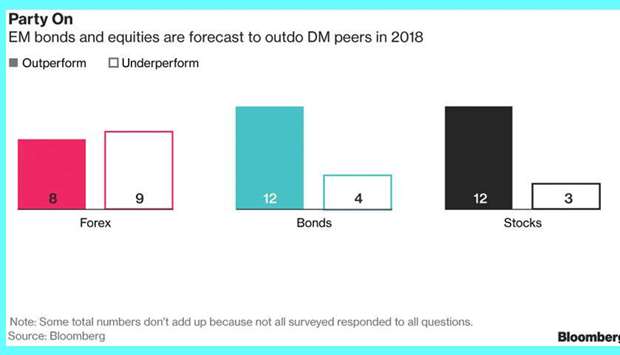Bulls will retain the upper hand in emerging markets this year, though some assets may face a bumpier ride than in 2017.
Bonds and equities in developing countries will continue to streak ahead, outpacing their developed-nation peers into 2018, according to a Bloomberg survey of 20 investors, traders and strategists. Currencies, however, may struggle to stay in front. The survey was conducted December 5-14.
And while the Federal Reserve’s actions will remain key in determining the fate of what has been the strongest equity rally for emerging-market stocks since 2009, geopolitical risks will be less of a focus as investors zero in on Donald Trump and the outlook for the world’s second-largest economy: China.
“The environment for emerging markets was great in 2017 with the Goldilocks factors of economic growth and low inflation in industrialised countries,” said Hideo Shimomura, chief fund manager in Tokyo at Mitsubishi UFJ Kokusai Asset Management Co, which oversees the equivalent of $114bn. “The EM rally we saw this year will probably extend into 2018, but after a period of strong growth and low inflation, some adjustment will be inevitable.”
Investor darlings in 2017 thanks to their high yields and buoyant growth prospects, emerging markets have weathered Trump’s protectionist rhetoric and a swathe of geopolitical brush fires - from the Middle East to the Korean peninsula.
But after the rally in stocks and currencies last year, investors may become more selective in 2018 as headwinds like Fed tightening weaken the appeal of emerging markets.
Consistent with a survey in October, market watchers continue to see the Fed and President Trump’s policy moves to be key for developing-country assets. What happens with China – where authorities are waging a battle against debt and President Xi Jinping is cementing his power – has edged up in the rankings.
Going forward, Mexico’s peso and bond market as well as Brazilian equities are among the most-favoured emerging-market assets, while Turkey’s assets ranked low given the country’s political uncertainty. The lira, one of the worst performers in emerging markets last year, will remain in the doldrums in 2018. The currency plunged to a record low as President Recep Tayyip Erdogan criticised the central bank in November, saying it was on the “wrong path” in tackling soaring inflation.
But in general, the stars will continue to align from a macroeconomic perspective, with global growth expected to be steady and inflation subdued, said Colin Harte, a London-based fund manager and strategist for multi-asset solutions at BNP Paribas Asset Management, which oversaw the equivalent of $673bn at the end of September.
“This Goldilocks environment will be one where central banks will continue to pursue accommodative monetary policy and follow their existing reaction functions,” he said.
Survey respondents were also asked about inflation and general economic outlooks for 11 developing nations.

PART
